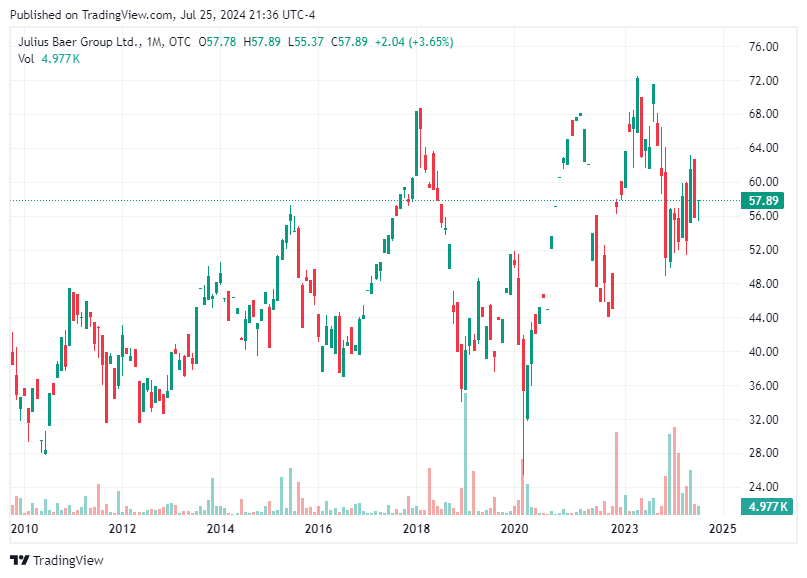Swiss Private Bank Reports Lower Profits
Julius Baer Reports Lower Profits, Missing Consensus Forecasts.

Disclaimer: This article is for informational purposes only and does not constitute financial advice. The opinions expressed herein are those of the author and do not necessarily reflect the views of Julius Baer or any affiliated entities. Readers should conduct their own research and consult with a financial advisor before making any investment decisions.
Real-time information is available daily at https://stockregion.net
Swiss private bank Julius Baer has reported lower profits for the first half of 2024, a development that has prompted a market reaction, including a 10% fall in the bank's shares on Thursday. This decline follows a period of extensive challenges for the wealth manager, as it failed to meet profit forecasts and saw only a modest increase in cash inflows from high-net-worth clients.
Financial Performance in H1 2024
Julius Baer's performance in the first half of 2024 has been marked by increased client assets and heightened activity; however, these positive indicators were overshadowed by rising interest expenses. The bank's net new money inflow was reported at 3.7 billion Swiss francs, aligning broadly with expectations but representing a substantial drop from the 7.1 billion Swiss franc inflow recorded in the same period the previous year.
The annualized growth rate of 1.7% was also notably lower when compared to Swiss rival EFG International, which reported attracting net new money of 5.2 billion Swiss francs for the same period, translating to an annualized growth rate of 7.3%.
A factor contributing to Julius Baer's disappointing results was a considerable drop in net interest income. The increased payouts to clients holding deposits exacerbated this issue. The adjusted net profit for the bank fell by 15%, landing at 459.7 million Swiss francs ($520.79 million), which was below the consensus forecast of 490 million Swiss francs. This shortfall highlights the challenges the bank faces in navigating the current financial landscape.
Leadership Changes and Strategic Shifts
The first half of 2024 also witnessed notable changes in Julius Baer's leadership. Following the departure of CEO Philipp Rickenbacher, who exited after the bank reported substantial losses related to loans extended to the now-collapsed property giant Signa, the company appointed interim CEO Nic Dreckmann. In a bid to rebuild confidence and stabilize operations, Julius Baer recently named Goldman Sachs partner Stefan Bollinger as its new CEO.
Dreckmann expressed optimism about the bank's recovery, stating, "After a challenging start to the year, Julius Baer is now regaining its momentum." He reassured stakeholders that client concerns following the Signa episode had been addressed, saying, "That's absolutely the case, we've passed that one."
Despite Dreckmann's reassurances, the bank's struggle to completely restore client confidence was evident. The aftermath of the Signa affair led to cash withdrawals in January, with inflows turning positive from February through June. However, the net new money figures indicate a slower pace of recovery compared to previous periods and competitors. Market analysts have weighed in on Julius Baer's performance, expressing a mixture of concern and cautious optimism. Citi, in a note, described the bank's first-half results as disappointing, particularly highlighting the profit miss. Bank Vontobel analyst Andreas Venditti pointed out the absence of a new share buyback program and the sluggish recovery of net new money as key disappointments.
Venditti articulated the broader sentiment among analysts and investors: "It shows the bank is still trying to rebuild confidence and this is going to take some time." He added that the newly appointed CEO Stefan Bollinger will face significant challenges, including restoring confidence among customers, employees, and regulators following the Signa debacle.
Future Outlook
As Julius Baer navigates the complexities of the current financial environment, the focus will be on strategic initiatives to rebuild trust and enhance profitability. The appointment of Stefan Bollinger signals a commitment to strengthening leadership and addressing the underlying issues that have impacted the bank's performance. The task ahead for Julius Baer involves not just stabilizing operations but also reinvigorating growth and innovation. The bank's ability to effectively manage interest expenses and optimize its asset portfolio will be critical in achieving these goals. Furthermore, maintaining transparency and proactive communication with stakeholders will be essential in regaining and sustaining client confidence.
Julius Baer's first-half results for 2024 reflect a period of challenges and transitional dynamics. While increased client assets and activity indicate potential for growth, higher interest expenses and a legacy of recent setbacks have tempered overall performance. Leadership changes and strategic shifts are underway as the bank seeks to navigate these complexities and restore confidence across its stakeholder base.
As the financial industry continues to evolve, Julius Baer's journey will be closely watched by analysts, investors, and competitors alike. The coming months will be crucial in determining whether the bank can successfully overcome its current challenges and emerge stronger in the competitive landscape of Swiss private banking.
Disclaimer: The information provided in this article is intended for informational purposes only and should not be construed as financial advice. The views expressed are those of the author and do not necessarily reflect those of Julius Baer or any associated parties. Readers are encouraged to perform their own due diligence and consult with a financial advisor before making any investment decisions.
Real-time information is available daily at https://stockregion.net


